Rohingya refugees: Why I fled
Twelve stories of lost homes, lost lives and a perilous search for safety
Since late August, hundreds of thousands of Rohingya have poured into Bangladesh to escape bloodshed in Myanmar’s Rakhine State. Their stories include claims of murder, rape and arson, and are all unverified accounts of what the UN has called a “textbook case of ethnic cleansing.”

Nadir Ahmed
Nadir Ahmed
40 years old, Maungdaw township
I was a farmer in a village just outside Maungdaw township. I grew up there and owned three acres of land which I cultivated to grow rice.
The conflict was nowhere near our village, but the military and Buddhist civilians still burned down my house. The same thing happened to every village in the surrounding area.
We have no rights in Myanmar, so my only choice was to go to Bangladesh.
It was a long walk to Bangladesh, I have eight children and we found it very difficult. Everyone was scared because we have never left Maungdaw, so did not know what to expect in Bangladesh.
We crossed the river to Bangladesh by boat. We paid the owner 20,000 Myanmar Kyat ($15) for our family to cross alone -- if it was overloaded it would have sunk.
I have no idea what the future holds, we just aim to get through each day.
We are starving here, we need food and I contracted malaria during the journey, I need treatment.
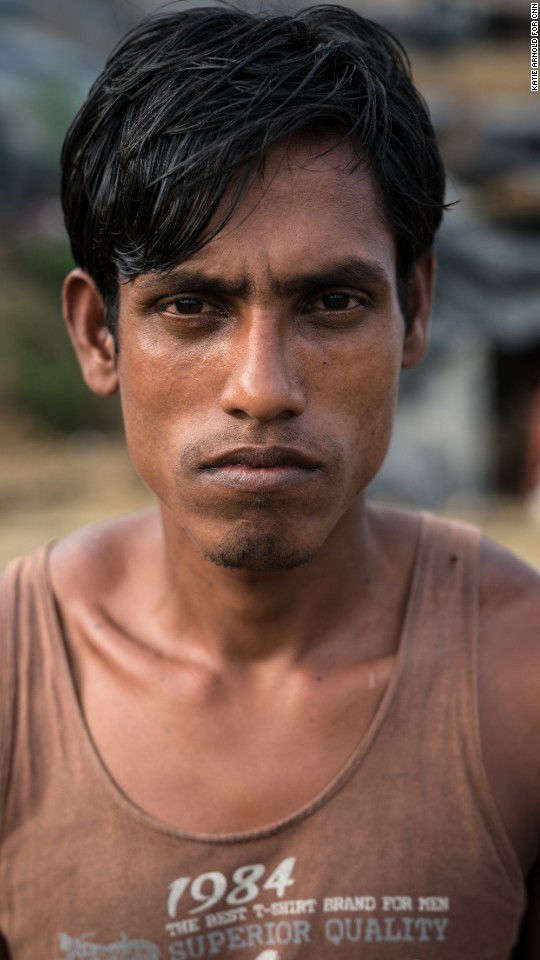
Abul Basar
Abul Basar
20 years old, Maungdaw township
I got married two years ago to a lovely woman and I had a little business selling betel leaves to the community. Through this job I earned enough money to support my family and parents.
I was very scared when the conflict started because last year the military arrested and killed lots of men from my village.
When the military entered my village, I ran to a nearby hill. From there I saw the military and members of the Rakhine community take my wife from the house and rape her. I saw them do whatever they wanted to her.
Then 20 people, mostly women, were put inside a house and burned alive.
The world went dark for me at that moment, I was so sad for my wife.
I was inconsolable so other people from my village had to carry me to Bangladesh. I don’t remember the journey.
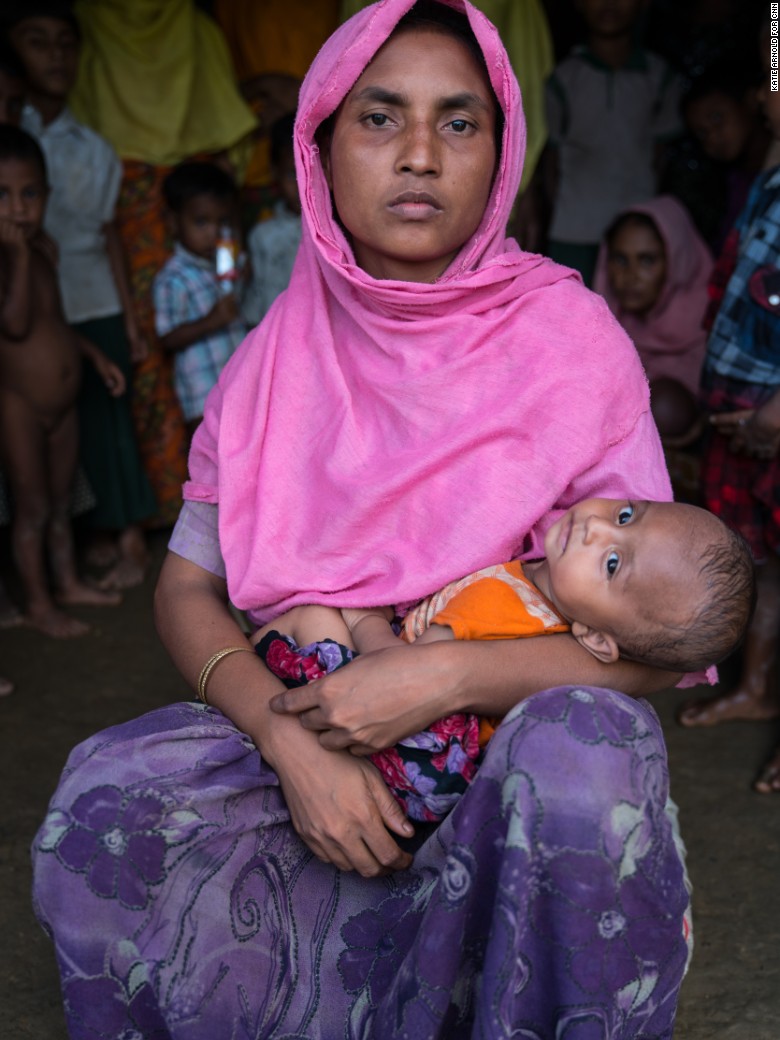
Rehena Begum
Rehena Begum
25 years old, Maungdaw township
Before the crisis I led a very simple life. We survived off a small paddy farm and my husband’s bamboo business.
Then, one afternoon, the military came to our village in three trucks. They fired guns at us and torched our houses.
Everyone was running in different directions and both my brother and husband were hit by bullets. Everyone was trying to save their own lives so we could not stop to help each other.
My brother died on the spot. We could not retrieve the body so he has not had a proper Islamic burial.
It took four days to walk to Bangladesh. At the border, some Muslim men offered us their boat.
We were so lucky because the two boats in front of us were shot by the Myanmar military and sunk. I think everyone in those boats died; there were bodies floating in the water.
We hid our boat behind some trees and managed to cross once the military had left. My husband is now in hospital in Chittagong. Because his wound is big and infected, they say he needs an operation.
I am grateful because the world is helping by giving us food, but we want this to be temporary. If only we had our own country we would not need their support.
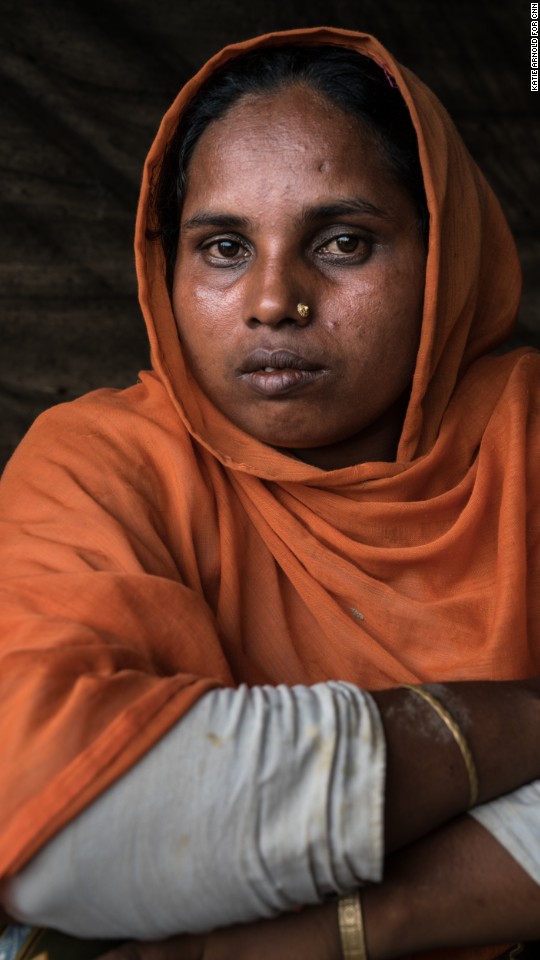
Anuwara Begum
Anuwara Begum
30 years old, rural Maungdaw
Before this crisis I lived with my husband who earned money as a day laborer. We did not find life too difficult. I liked our life.
We had three children and I hoped they would finish their school and then get married.
Two weeks ago, the military came into our village and started burning down our houses. The whole village ran into the forest and hid.
Our house survived so, once the gunfire stopped, my husband returned to our house with our neighbors to collect some belongings. But the military was waiting and they shot him dead.
When my neighbors returned and told me he was dead, all I could think about was how to save my children, how to save the rest of my family, so I fled to Bangladesh.
I was very sad to leave Myanmar. I could not carry anything with me, just my children and the clothes on my back.
I do not have any cooking utensils so have not been able to feed my children. We don’t have any support, I just want my old life back.
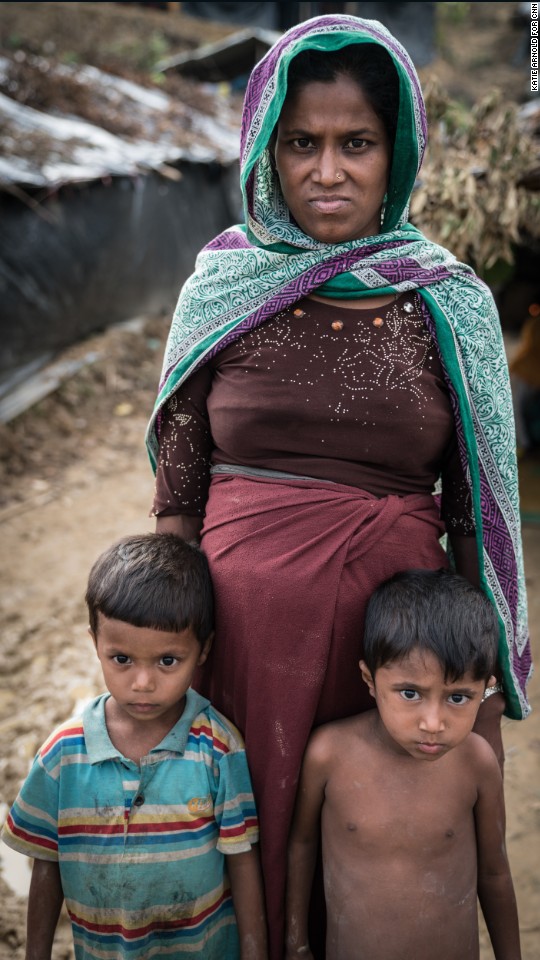
Nur Ayesha
Nur Ayesha
30 years old, Myaw Tung
We used to live in a big house beside a lake where my husband would go fishing. I was very happy there. I have two children and another one on the way.
Two weeks before the crisis, a bomb exploded near our village. We knew the military would come to the village to find the culprits, so the men went to the lake to hide.
I have not seen my husband since.
He had no connection to the ARSA [Arakan Rohingya Salvation Army] but because of them he had to run away. And because of them he is probably dead.
Once the crisis started, the military returned to the village. They burned down my house and shot my two cows. With my husband gone, my only option was to come here to Bangladesh.
I sold my jewelry, and paid someone to take my family across the border.
We were walking for five days; my feet were so swollen.
I am finding life here very difficult on my own. No one helped me build a shelter for my family, even though I am pregnant.
What type of world am I bringing my child into?
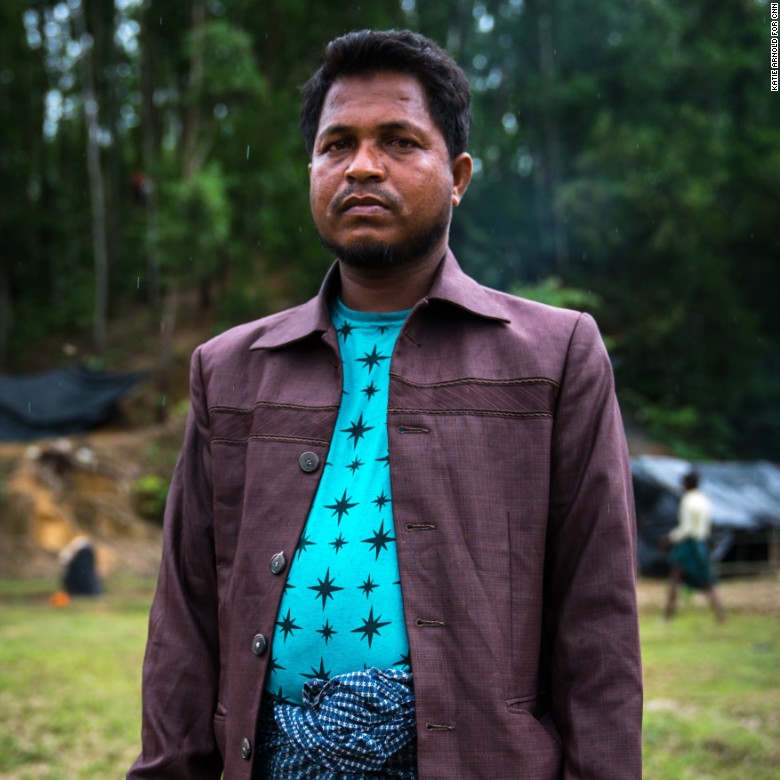
Muhammed Amin
Muhammed Amin
35 years old, Duchang Fara
I used to teach Islamic studies at the local madrassa. I was not a religious leader, but I tried to inspire the younger generation.
I did not enjoy my life in Myanmar, I was not happy. We lived in constant fear.
When the crisis started I tried to convince my community to stay. I thought there was safety in numbers. But then I saw the military kill 20 people, right in front of my own eyes.
I tried to rescue one of my neighbors who had been shot in the chest, but he died in my arms.
It was chaos, everyone was running in different directions.
After the attack, we went back to the village to search for remains. It was then that I found the body of my 25-year-old nephew.
We hid in the forest for a few days as we did not know how to get to Bangladesh. We were eating nothing but leaves.
Finally, we found a way out, but it was a very difficult path because all the formal routes were occupied by the military.
I don’t want to return to Myanmar, my house and my land are not important to me.
What is important is my life, and I would not have one in Myanmar. We have no future there.
But I want the world to know that we are Rohingya, and we want rights.
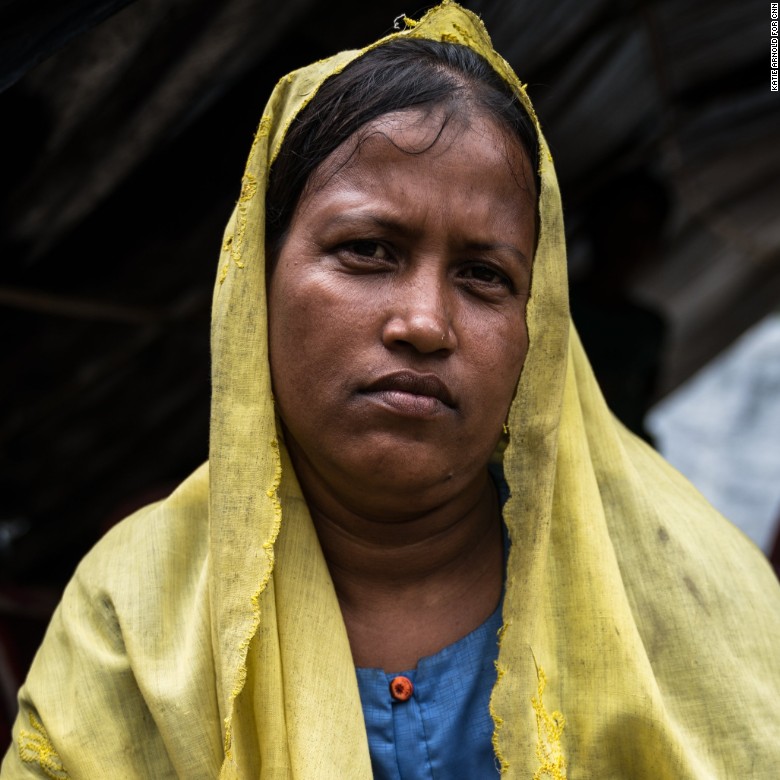
Sajiba Begum
Sajiba Begum
35 years old, Taung Bazar
Before the crisis we were very happy in Myanmar, we had a family with six children, a community. Even though we could not travel from one place to another, I was satisfied with my life.
Then the military started burning down our houses, and firing their guns at us, so we had to leave our village with nothing but our clothes.
When we were fleeing to Bangladesh, we came across the military and they started firing at us again.
Our group split up and I ran towards the mountain while my eldest son ran into the forest.
I don’t know what has happened to him, we have not heard from him since. I fear he was killed so I am very sad.
The journey to Bangladesh was very difficult. The path was muddy and we had to cross the river by boat. I cannot swim so I was very scared.
I feel safe in Bangladesh, but I want to return to my country, once there is peace and we can live their freely.
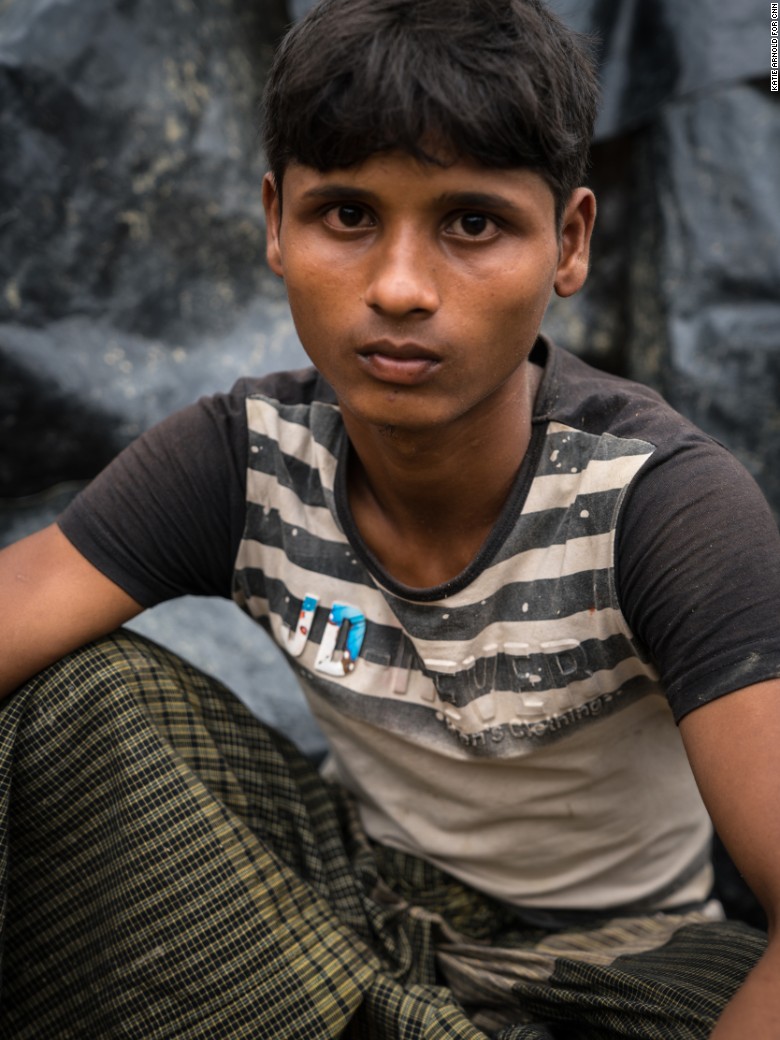
Solimullas
Solimullas
10 years old, Taung Bazar
Before the crisis I was studying at school. Sometimes it was difficult because the Buddhist children would throw stones at us on our way to school.
My favorite subject is Burmese, because it is the language of my country and if I want to live there I will need it to communicate with my neighbors.
We were sleeping one night when the military came to our village and started firing their guns. One soldier entered our house and started taking our money and jewelry.
My brother-in-law complained so they started beating with him a stick and then arrested him.
I felt very sad at that moment because they were hitting him and because we could not do anything except watch. I went with my sister to the police station to ask them to release him, but they started beating her too. It was horrible.
Because they burned our house and took our money we had to move to Bangladesh. I did not want to go to Bangladesh, but my mother made me.
We were walking for four days and did not eat anything.
The road was very muddy and we walked though lots of villages that had been burned to the ground.
My sister did not come with us because of her husband. She would prefer to die than leave him behind. I am really afraid for her because if the military do anything to her we can’t help her.
I am very unhappy here because we are stuck and sleeping on a muddy field.
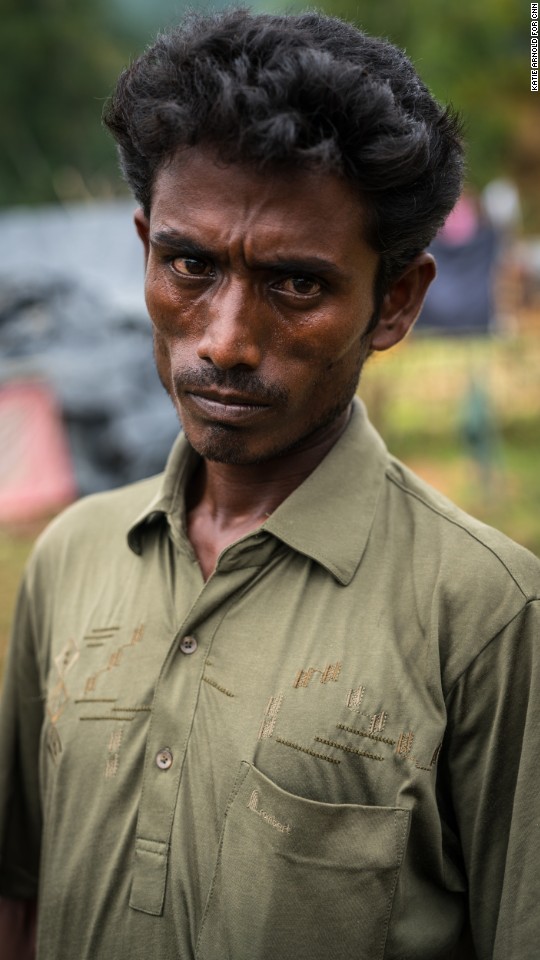
Kobir Ahmed
Kobir Ahmed
27 years old, Tha Win Chaung
I used to live in Tha Win Chaung, near a Buddhist village. It was very difficult because were not allowed to leave the village or bring in goods from other parts of the country.
I had a clothes shop which sold goods from Maungdaw -- that was the furthest place I could visit. I earned quite good money from the shop, but sometimes the Buddhists would come and threaten me or steal my goods.
At first the crisis did not affect our village, but a few days after the attacks on August 25th the military came and started shooting and burning our houses.
Those who were fit ran away but some young and old people did not escape and were burned in their houses.
We all gathered at a safe place but it was very muddy so my uncle went back to the village to collect some mats for us to sit on. Shortly after he left we heard gunfire and we never saw him again.
Before the crisis, we were beaten by the police, they would steal our money and we were not allowed to move freely, but this was too much.
They were shooting directly at us, trying to kill us. I could not bear it anymore so I walked to Bangladesh with my family.
The Bangladeshi people are supporting us as much as they can. We really appreciate them giving us food and clothing but this is a small country, they cannot look after us forever.
I am very sad here, I want to go home.
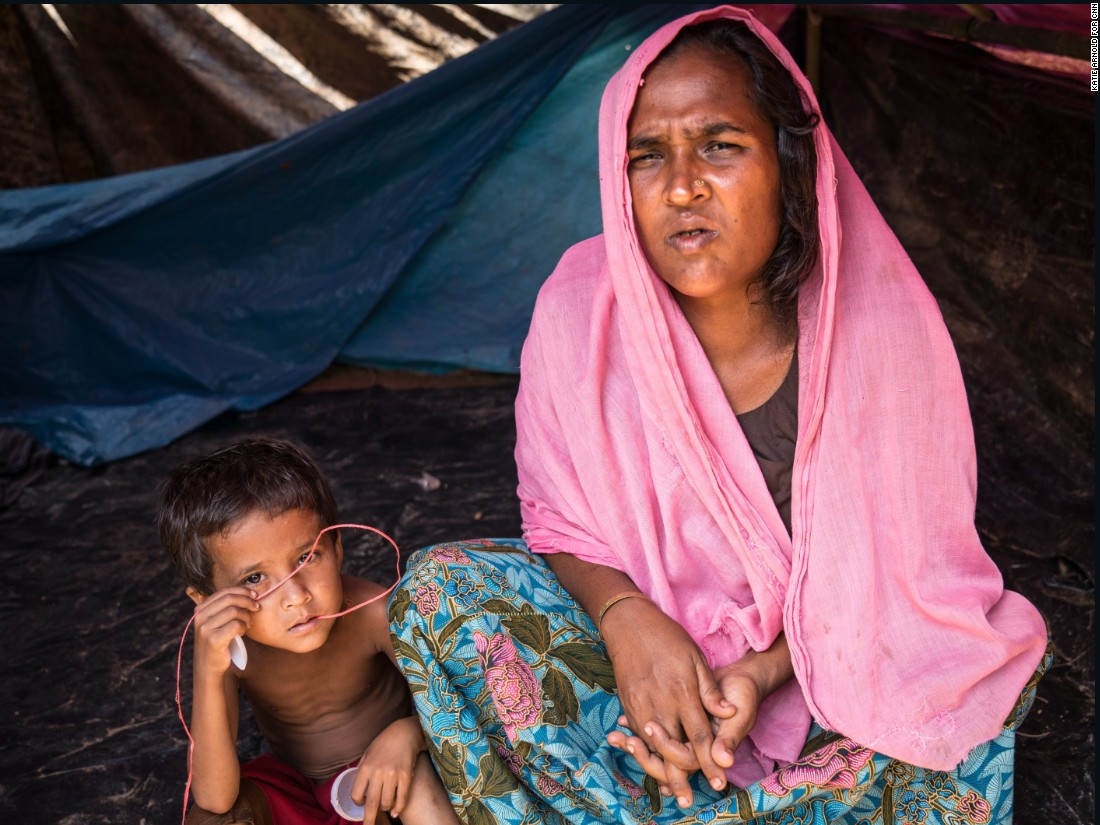
Leila Begum
Leila Begum
35 years old, Chin Kali
I used to live in Chin Kali with my husband and four children. We had three acres of paddy fields and my husband worked as a day laborer so we were quite comfortable. I dreamed about my two sons becoming religious leaders and I hoped the girls would graduate from school, just like the boys.
A few weeks ago, the military entered our village and started shooting at us. It was chaos, everyone was running in different directions.
During the chaos, my sons got separated from me. My husband was running near me but the military caught him and stabbed him with a knife -- I saw it, right beside me.
I did not see what happened to my sons exactly, but once the military left the village we returned and found their dead bodies on the ground. I was distraught -- in such a short space of time I lost all the men in my family -- I could not think straight.
My two daughters had stayed closed to me so they managed to escape the military.
We slept in the forest for four days, then spent two days walking to Bangladesh through the mountains -- I cried the whole way.
When we reached the border, we had to step over three dead bodies that had been shot not long before.
I am a bit happier now I am in Bangladesh as I cannot hear the sound of gun shots. It is a lot safer, but I wish we had the same opportunities, money and facilities that I had in Myanmar. There are no schools for my children or jobs where I can earn money.
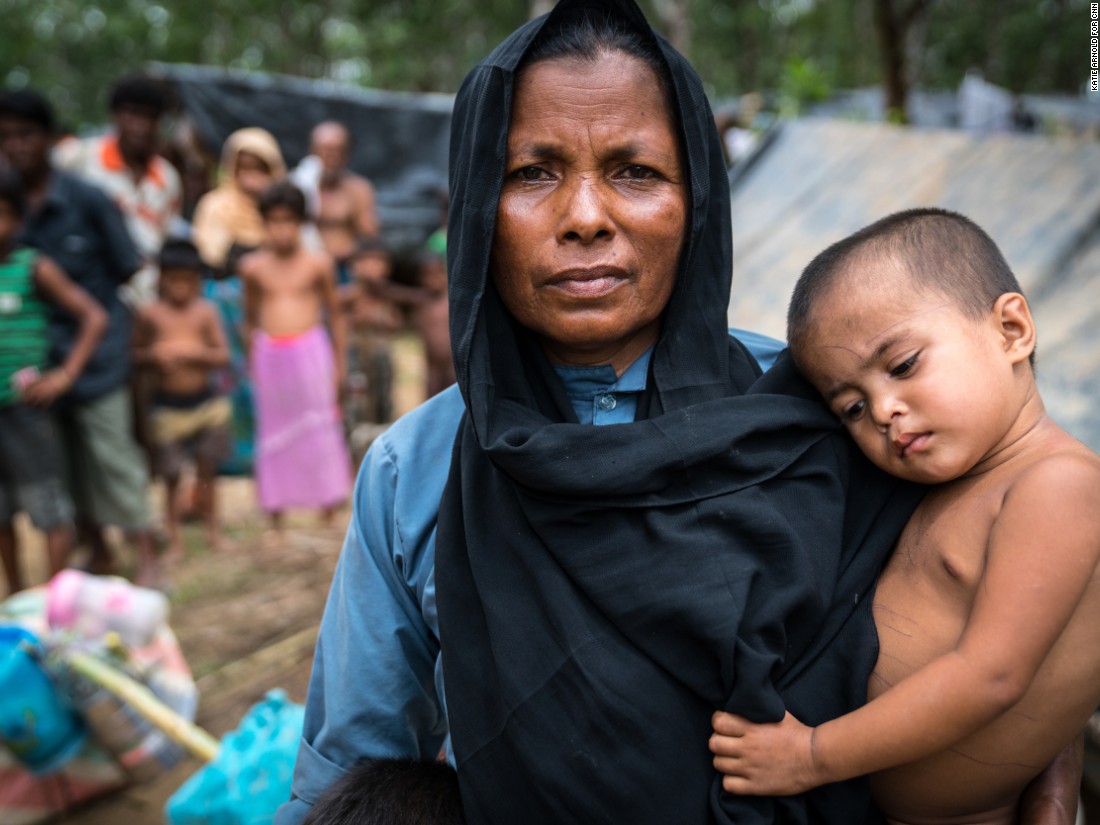
Rohima Kadu
Rohima Kadu
50 years old, Chin Khali
I was quite happy in Myanmar, I had six children and my family did not experience any difficulties or distress. My husband died a few years ago, but my sons worked as day laborers and supported me well.
Then the military came and started setting fire to our houses. I lived with my eldest daughter who was suffering from malaria at the time. She was too weak to flee the house. I had to make a decision so I grabbed my grandchildren and ran to the nearby forest.
They burned my daughter alive. When we went back to the house, all I could see were the black remains of her skull. I feel like a terrible mother -- I saved my own life but not that of my daughter.
The journey to Bangladesh was hard, especially with three young children. The road was muddy and we had to walk through thick forest and jungle. But thanks to God we all survived.
I am finding life here very difficult as I am responsible for my three grandchildren, but there is no food so I cannot feed them. One of them is sick, but I don’t know where to go.
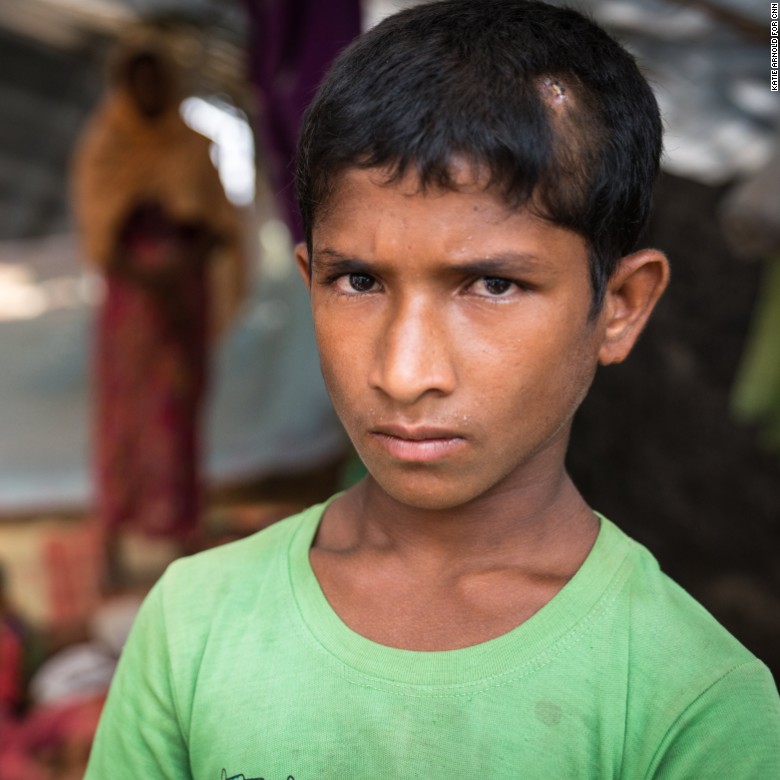
Mohammed Younus
Mohammed Younus
13 years old, Taung Bazar
Before this crisis I was studying at the madrassa. I liked learning about the holy Quran and I hoped to teach Islamic studies to other people once I graduated.
On August 25th, ARSA (Arakan Rohingya Salvation Army) and the military started fighting in my village.
We had to run because the military were firing their guns at us, and one of their bullets hit me in the head.
I don’t really know what happened next because I passed out -- it was so painful.
My neighbors must have carried me to the clinic where they gave me some medicine, then my family started walking to Bangladesh.
I was still feeling weak, so they gave me a walking stick.
I miss my village very much. I really want to go back so I can continue with my education.
I don’t really like it in Bangladesh because my whole family has to live under a sheet of plastic and there is not enough room for all of us.